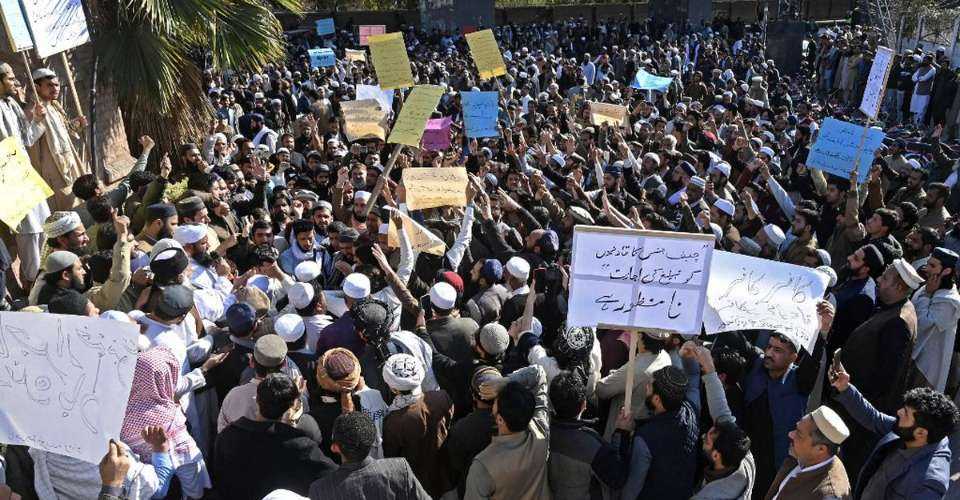
Muslims protest against Supreme Court Chief Justice Qazi Faez Isa, in Peshawar on Feb. 23. Pakistan’s Supreme Court has defended its top judge after a ruling he issued related to blasphemy that sparked an online backlash and led to thinly veiled death threats. (Photo: AFP)
A Muslim mob brutally killed another Muslim man and burned his body in Pakistan’s northwestern Khyber Pakhtunkhwa province on June 20 after accusing him of burning pages of the Quran.
The 35-year-old Muhammad Suleman was assaulted by hundreds of angry Muslims in Madyan, a popular hill station of Swat Valley of the province bordering Afghanistan.
Suleman was visiting the picturesque valley from Sialkot of Punjab province as a tourist when he was attacked, said Swat district police officer Zahidullah Khan.
Khan said that police rescued the victim and placed him under police custody, but the angry mob attacked the police station and beat him to death for allegedly committing blasphemy.
“Announcements were made by using the sound system of the nearby mosques, and that instigated thousands of people. Everything happened within 45 minutes,” Khan told UCA News.
“They resorted to aerial firing from roofs around, broke our gate, ransacked offices, set the building on fire, and burnt a police van and a motorcycle. Other vehicles were also damaged. Eight cops were injured. Attackers are being identified through CCTV footage and videos on social media,” he added.
Khan said that the body had been transferred to an undisclosed location.
“We have recovered some evidence but cannot disclose it because of strong religious sentiments,” he added.
Local Muslims reportedly rallied in the district to condemn the alleged blasphemy following Friday prayers.
Markets were closed in Madyan, and a large contingent of police were deployed in the Swat district to avert further violence.
Swat Valley, famed for its scenic landscape, earned infamy after the Pakistani Taliban occupied it and made it a stronghold before being flushed out by the military.
Malala Yousafzai, a Pakistani student who later became a campaigner for women's rights and education, was shot in the head by the Taliban in 2012 in Swat Valley. She survived and won the Nobel Peace Prize in 2014 at 17.
Swat-based human rights lawyer Zigar Sher said the mob lynching based on the desecration of the Quran was shocking and surprising.
“There are so many unanswered questions. Why a tourist from Punjab would choose our soil to commit blasphemy,” he told UCA News.
“The tragedy would affect tourism and social life in our valley, already a victim of Talibanization. The infrastructure has still not been renovated after the 2022 floods, the worst in the country's history,” he regretted.
Blasphemy is punishable by death or life sentence in Pakistan. However, no one has been executed for blasphemy so far.
In recent years, the South Asian nation of 241 million people has witnessed numerous cases of mob lynching.
The draconian blasphemy law in the Islamic nation is often used against Christian, Hindu, Sikh, and Ahmadi minority communities to settle personal scores.
Last month, an elderly Christian, Nazir Masih, in Punjab province's Sargodha town, was attacked after being accused of committing blasphemy by burning pages of the Quran. He died in a hospital on June 3.
When a mob attacks “nobody awaits due process of law. They have become prosecutors and executors themselves,” Imtiaz Alam, secretary of the South Asian Free Media Association, told UCA News.
“The environment of fear and false allegations has suppressed religious freedom," he said, adding that the strict blasphemy laws and how they are implemented adversely affect the image of the country.
"Sadly, it’s a business as usual for the state, for whom human life is not a priority,” he said.


